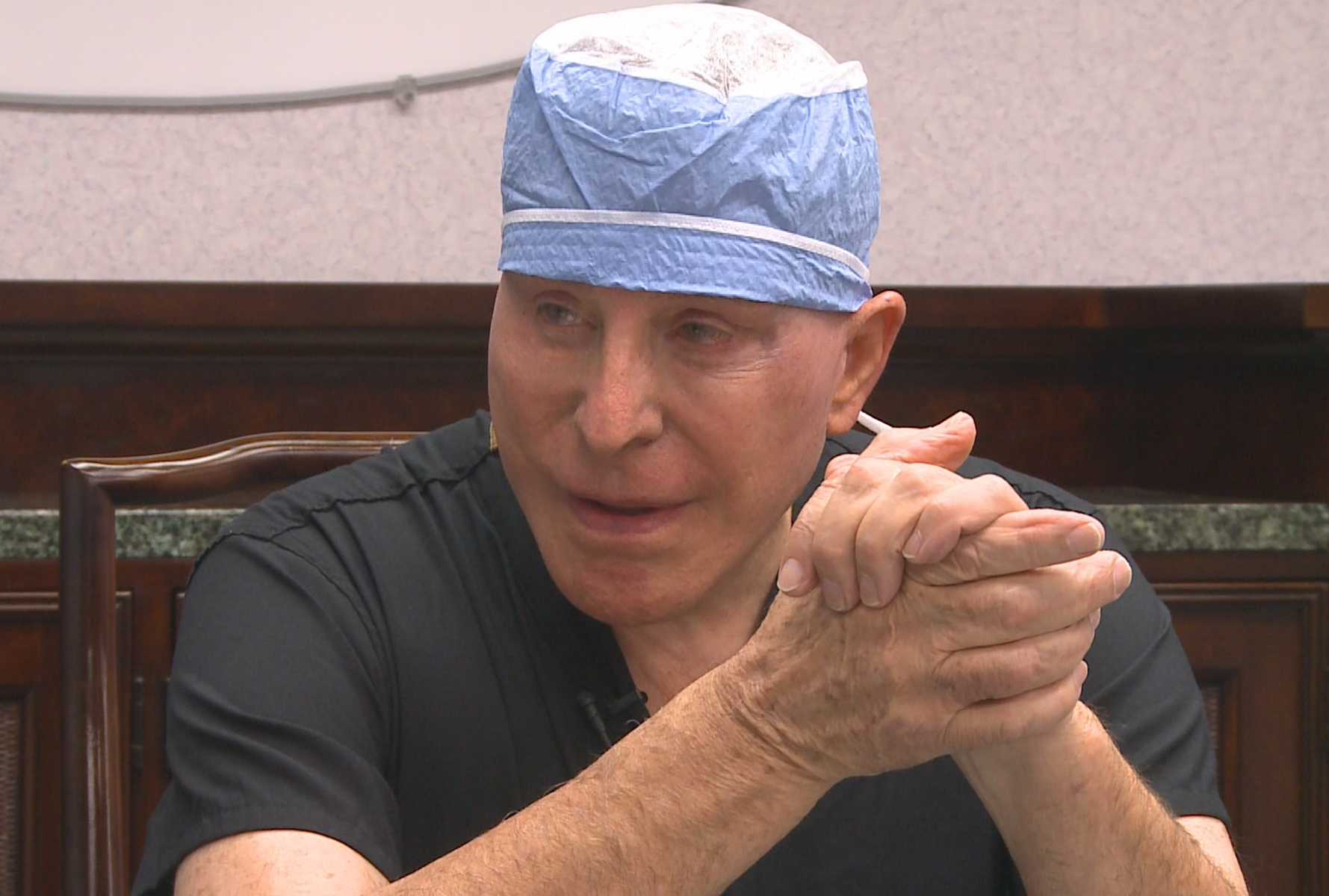Pasco County, Florida -- Dr. Alfred Bonati is the founder of the Bonati Institute in Hudson and has been performing laser surgery on people suffering through pain for decades.

Last month, 10 Investigates was invited to watch Bonati perform laser surgery after we told him we had some questions about his license and practice.
While touring the medical facility, we met Helena Baldwin, who was thrilled with the doctor's techniques.
"He has saved my life. He has kept me walking. He made me walk again, and for that I am truly grateful," she said.
We also met a chiropractor, Dr. Joe Santy, who underwent the laser surgery just one day before.
![Does Florida Board of Medicine protect you? [video : 74102096]](http://wtsp-download.edgesuite.net/video/74102096/74102096_Still.jpg)
Santy, who has referred several of his own patients to Bonati, had been experiencing back and neck pain himself for the past 14 months.
Santy told us he was immediately relieved after Bonati performed the minimally invasive surgery.
Baldwin and Santy are just some of the many patients satisfied with their surgery results. However, 10 Investigates uncovered Bonati was involved in more than 50 lawsuits noting patients' complaints, in federal and circuit courts, as well as being disciplined and fined by the Florida Board of Medicine.
While the Board of Medicine appears to have taken action with discipline and fines, 10 Investigates found the consumer group, Public Citizen, has rated the Florida board as one of the worst in the country because it takes 434 days to resolve a dispute and has one of the lowest serious disciplinary rates in the nation.
In 2000, the Florida Board of Medicine, which is appointed by the governor, found Bonati violating state medical standards in his treatment of 14 patients.
The board's 2000 findings are detailed in this 138-page Department of Health Florida Board of Medicine final report.
10 Investigates also found transcripts from a 2000 Board of Medicine meeting, where then Chairman Dr. Zachariah Zachariah, said, "He's totally dishonest, he is the most outrageous case I've seen since I've been on the board."
Zachariah told us this past August, "If I said what I said, but I don't recall all the specifics of the case."
While Bonati stated he was exonerated in each case considered by the board, the administrative reports document hundreds of thousands of dollars that he was fined.
When 10 News asked Bonati about the fines, he said, "Well, I understand, but you need to understand when you deal with government and you deal with the legal system, you need to compromise."
He also added, "The government spends money and these people are politically elected. The people that are in the Board of Medicine are politicians so when somebody is accused of something they don't want to look bad, they are going to create some sort of small charges."
The governor-appointed board consists of physicians and nonphysicians, but no politicians.
There are 15 members on the board and all confirmed by the Senate.
The Florida Board of Medicine consists of 12 board members who are licensed physicians in good standing, live in Florida, and who have been involved in practicing or teaching medicine for at least four years immediately preceding being named to the board. In addition, board rules require:
-- One of the physicians must be in a private practice and a full-time staff member of a teaching hospital.
-- One of the members must have graduated from a foreign medical school.
-- The three other members must never have been licensed in the health care field as a practitioner, but there must be a member who is licensed as a risk care manager.
-- Finally, one member must be at least 60 years old.
10 Investigates uncovered the Florida Board of Medicine disciplined Bonati four times since 1994.
When we asked Bonati about all the discipline from the Board of Medicine, he said he never had any problems with his license.
However, 10 Investigates found that in 2000 Zachariah moved to revoke Bonati's license saying, he "Is a major nemesis to the medical profession and a great danger to the citizens of Florida."
However, after Zachariah made the motion to revoke Bonati's license and the board refused to accept a settlement Bonati's attorney and the board's attorney had agreed to, Bonati filed suit against the entire board.
The board then allowed him to pay $150,000 in fines and costs so he could continue performing surgery.
At the August Board of Medicine meeting we asked Zachariah, who is still currently a member of the board, if the board is afraid to take action against someone who is going to sue them?
"No, no, I cannot comment on something that happened in the past," Zachariah said.
According to the most recent April 2015 Board of Medicine final order, Bonati was fined $79,000 for several patient complaints as far back as 2005 including:
-- One patient experienced paralysis in both legs, weakness in the right arm during surgery, and suffered a huge loss of blood.
-- A patient had an emergency catheter inserted after surgery.
-- Another patient underwent 13 surgeries that were deemed medically unnecessary and also had spinal fluid leaking that Bonati could not repair.
When we asked Zachariah how the citizens are protected from someone the board feels so strongly shouldn't be part of the medical profession, he said, "I don't think it is appropriate for me to comment on a case that's not on the agenda."
After all of the lawsuits and discipline from the Board of Medicine, Bonati continues practicing. "What I do is great medicine and what I do is an incredible service to my patients," he said.
According to several federal lawsuits, and in his own sworn testimony, 10 Investigates found Bonati failed the Federal Licensing Examination five times.
Bonati also represents himself as board certified, despite failing the American Board of Orthopedic Surgery examination twice and never passing.
Instead, Bonati created his own board that is not approved by the state of Florida for certification nor is it approved by any other recognizing agency approved by the Florida Board of Medicine.
Bonati said, "I created (his board) to the same standards as the other board."
In addition, Bonati's resume was brought up in several federal lawsuits after questions were raised regarding his education.
The lawsuits note Bonati attended college at the University of Naples, in Naples, Italy, "but under oath, he admitted a bogus institution he listed as attending and doesn't even know if it exists."
He also admits that he falsely represented attendance at a Catholic university in Rome, Italy.
When we questioned him about the bogus institutions Bonati said, "I was a young guy; stupid probably -- and I put something to beef up a little bit my resume."
Another problem for Bonati is that he used two letters of recommendation to the Bowman-Grey School of Medicine at Wake Forrest University in Winston-Salem, North Carolina. However, as cited in several federal lawsuits, both physicians gave sworn testimony in trial and in deposition, denying writing the letters of recommendation.
"I never thought the lawyer will catch that one and try to destroy me with that," Bonati said.
Attorneys have also tried to destroy Bonati's credibility with the fact he claimed in his Florida Practitioner Profile License to have completed a residency in neurological surgery at the University of Alabama-Birmingham.
10 Investigates also uncovered court records showing Bonati was not granted formal admission to the program and didn't even complete that program.
In addition, his 2009 Florida Practitioner Profile says he obtained his M.D. degree at the Universidad De Cadiz, however under oath in numerous state and federal cases he has testified he obtained his M.D. degree from the University of Seville.
Despite all of these additional issues Florida Medical Board allows him to continue practicing medicine.
When asked if the citizens of Florida feel that the board protects them against doctors that the board feels are a danger to them, Zachariah said, "In general the board does a great job."
The Florida Board of Medicine also issued this statement:
"The Florida Board of Medicine is dedicated to ensuring that every physician practicing in this state meets minimum requirements for safe practice. The department will continue to work with the Legislature, medical examiners, Drug Enforcement Agency, Prescription Drug Monitoring Program and the Department of Business and Professional Regulation to integrate data sources for access to identify emerging trends in non-compliance with laws and regulations.
"The Board is continuously examining all of its processes and practices to assure quality care for patients, while ensuring due process for practitioners. Addressing disciplinary matters in a timely manner is a fair and just way to make certain that the department protects the public and serves Florida's licensees. Enforcing health care standards through timely discipline, education and, when appropriate, rehabilitation of physicians and other practitioners will help to ensure the best quality care all patients in the state of Florida."


